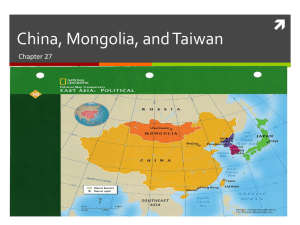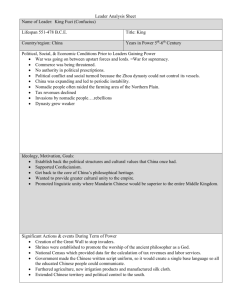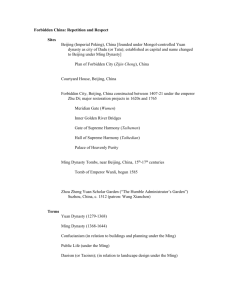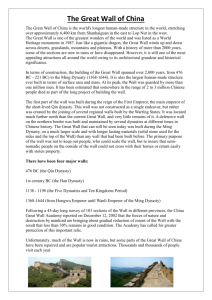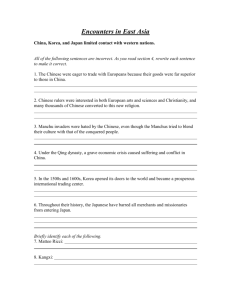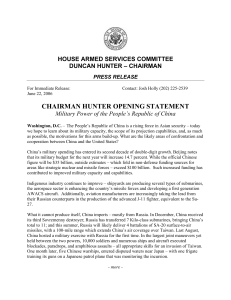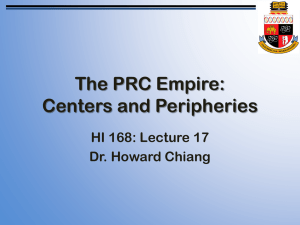The Great Wall of China - Daytona State College News
advertisement
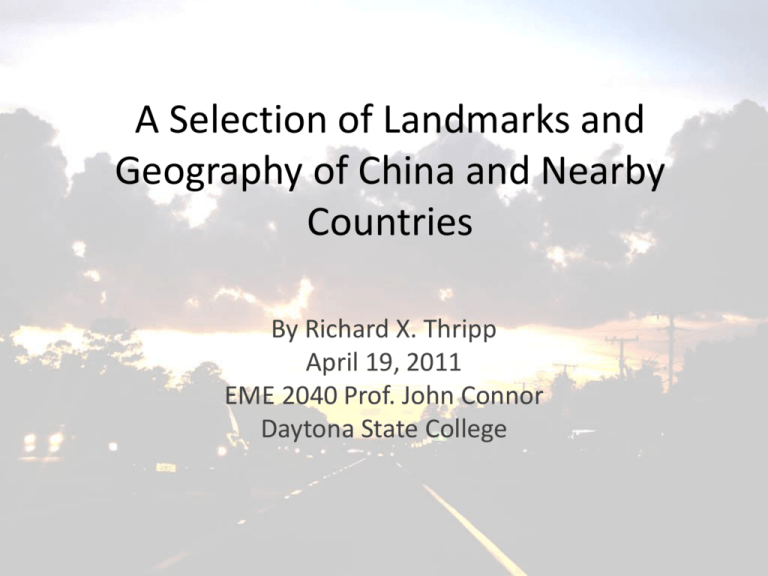
A Selection of Landmarks and Geography of China and Nearby Countries By Richard X. Thripp April 19, 2011 EME 2040 Prof. John Connor Daytona State College The Ming dynasty established and maintained the Great Wall in its current form from ~AD 1450 - 1630. The Ming dynasty was defeated by the Shun dynasty. A military general and opposition sympathizer named Wu Sangui opened the gates at Shanhaiguan in AD 1644, allowing the Manchus to capture Beijing and establish the Qing dynasty, after which China expanded into Mongolia and the wall was no longer needed. My Chinese grandparents riding an elephant in Thailand! Make sure to book such a trip with a company that does not abuse their elephants if you go on a safari in Thailand. Petronas Towers The Petronas towers are the tallest twin towers in the world, with 88 floors totaling 1242 feet in height (1483 ft. with antenna), constructed from 1992-1998 for $1.6 billion. On the morning of 2001 Sept. 12, a bomb threat prompted the complete evacuation of both towers, but no bomb was found so the towers were re-opened after 3 hours. The Great Wall of China is actually very difficult to see from the International Space Station, because it blends in with its surroundings, but was confirmed visible by astronaut Leroy Chiao on 2004 Nov. 24, from the ISS using a digital camera with a 180mm lens. Chiao’s photo faintly showing the wall. RADAR image of the wall. ISS photo of the pyramids of Giza. China is bordered by 14 countries: Mongolia and Russia to the north; Pakistan, India, Nepal, and Tajikistan to the southwest; Vietnam, Laos, Myanmar (formerly Burma), and Bhutan to the south; Kazakhstan and Kyrgyzstan to the northwest, North Korea to the east by the Yellow Sea, and Afghanistan to the west. China and the U.S. are about equal in size (counting Alaska), at 3.7 million square miles, but China has quadruple our population. China has about 1.33 billion people across a wide variety of climates who speak 292 languages, with Mandarin Chinese being the official language and Shanghainese, Cantonese, Hokkien, Taiwanese, Xiang, Hakka, and Gan being other popular dialects. The Chinese govt. estimates the one-child policy has prevented 400 million births through forced abortions and heavy fines on 36% of the population (mostly in urban areas). Taiwan (the Republic of China) and mainland China (the People’s Republic of China) are separated by the Taiwan strait. Taiwan is a highly developed nation with a population of ~23 million and land area of ~14,000 sq. miles, which claims independence from China after a protracted civil war from 1927 to 1949. Shrine for the finger bone of the founder of Buddhism. Shenism/Taoism (20-30%) and Buddhism (18-20%) are the most popular religions of China, followed by tribal religions (10%), Christianity (3-4%), and Islam (1-2%), with about 40% of the population being agnostic, non-religious, or atheist. Confucianism is popular among intellectuals. Statue of Mazu (Matsu), goddess of the sea born Lin Moniang circa AD 960. (京) Olympics 2008 Classical gardens Beijing is the capital of China, a metropolitan city with a 2000-year history and 22 million people. Beijing’s land area is 5.4 times larger than Volusia County, Florida. http://www.ebeijing.gov.cn/ Teresa Teng, famous Chinese pop singer, 1953-1995 Now it’s your turn to visit or read about China!



